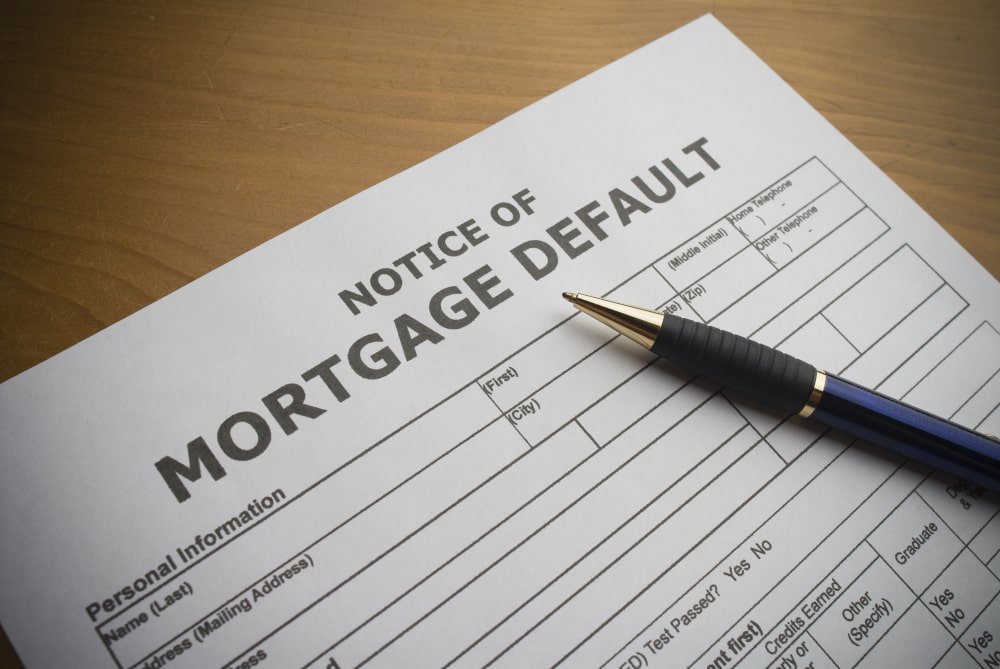Missed a Payment or Defaulted on Your Mortgage? What to Do Next

What Does It Mean to Default on a Mortgage?
Anytime you apply for a mortgage loan, you are entering into a formal agreement with your lender. Mortgage agreements are often accompanied by specific terms and conditions laid out in the form of a mortgage contract.
Of course, no two mortgage contracts are exactly alike. Your lender will usually lay down the specific terms for default when you first enter into your mortgage agreement. By signing off on your mortgage contract, you are making a commitment to uphold those terms.
Defaulting on your mortgage means that you have violated the terms of your mortgage agreement in some way. Failing to make your monthly mortgage, property tax, or homeowners insurance payments, for instance, may cause you to default on your mortgage. Other things like tearing down your home or significant changes to the home’s structure or use could also constitute default. That is why it’s critical to read through your mortgage contract thoroughly so that you do not unintentionally put yourself in default. If some of the wording is confusing, ask your mortgage broker to explain it to you. A great mortgage broker will go through these details with you automatically, but don’t be afraid to ask about something that is not clear to you.
Once you have defaulted on your mortgage, you will be sent a letter outlining your reason for default along with any outstanding payments, and providing a timeframe within which you must pay them back and rectify the situation. If you fail to meet these conditions, your lender can commence the power of sale process in order to sell your home and pay off the outstanding loan balance.
Consequences of Missing a Payment or Defaulting on Your Mortgage
What Happens When You Miss a Mortgage Payment?
When you miss one of your monthly mortgage payments, your mortgage will be considered delinquent until you make the outstanding payment. If you fail to make the payment within a reasonable time frame — as laid out by your lender — your mortgage will be labeled as default.
Once your mortgage is labeled as delinquent, you will start incurring late fees on your monthly mortgage payments. For example, if you miss your January payment, but make your February payment as per usual, you will incur late fees on both months. Your February payment will be used to pay off January, your March payment will pay off February and so on and so forth.
In order to avoid accumulating these late fees, you would have to make two payments at once— one for the current month and one for the month you missed. Of course, if you had trouble making just one payment last month, you might also find it difficult to come up with double that sum. Because of this, many homeowners end up accumulating months of late fees and falling significantly behind on their mortgage payments, tanking their credit scores in the process.
Missed mortgage payments will also greatly impact your ability to apply for other loans in the future. Any payment that has been late for at least 30 days could significantly impact your credit score and appear on your credit report for many years to come.
What Happens When You Default on Your Mortgage?
Unfortunately, there are a number of consequences you might experience after defaulting on your mortgage. Here are some common repercussions to consider:
- Your credit score will likely drop . Your payment and repayment history has a huge impact on your overall credit score . If you are defaulting on your mortgage, that usually means you have not been making your payments in a timely manner. You will get several points knocked off for every late or missed payment. If the defaulting process results in your home going power of sale or getting foreclosed, your score will drop significantly and can take a long time to improve.
- Your lender may accelerate your loan. Once your lender sees that you are failing to make your monthly payments, they may accelerate your loan and demand that you payout the entire mortgage loan immediately. This is usually an attempt to recoup their investment safely otherwise they will begin power of sale or foreclose proceedings on your home so that your lender can reclaim their investment.
- Your lender could sue you. In the event that your house is sold through power of sale or foreclosed, you should hope that the fair market value of your home is not less than your outstanding loan balance. If you cannot pay off your mortgage debt entirely through the sale of your home alone, your lender may sue you and require you to pay the difference out of pocket.
- You may have to file for bankruptcy. If you are still unable to pay your mortgage debt after the sale of your home and your lender is threatening legal action, you may be forced to file for bankruptcy . Filing for bankruptcy could help shield you from the judicial process and may help prevent you from being sued for the remaining balance of your debt.
Your Best Options for Security
If you are in a difficult financial situation and want to avoid defaulting on your mortgage, or have already defaulted and need help to get back on track, Clover Mortgage can help. Our team of mortgage professionals will help you create a personalized plan to improve your financial standing and security, and might even be able to get you a home equity loan to help pay off any missed mortgage payments and get you caught up.
Here are just a few of the approaches we can explore to prevent you from defaulting on your mortgage loan:
- Establishing a forbearance agreement. A forbearance agreement is an agreement between you and your lender that allows you to pause your mortgage payments for three to six months. During this time, your lender is prohibited from going power of sale or foreclosing your home or beginning the foreclosure auction process; however, you must make all the payments you missed once the grace period is over. This option can be a helpful tool for homeowners experiencing short-term temporary financial difficulties.
- Modifying the terms of your loan. A loan modification decreases the size of your monthly mortgage payments while simultaneously extending your repayment term. While this approach may require some negotiations with your lender, it is a great option for homeowners experiencing long-term financial difficulties.
- Refinancing your mortgage . If you have been keeping up with your mortgage payments and have a good credit score, but anticipate that you may soon be facing financial difficulties, refinancing your mortgage may be a good option for you. By refinancing your mortgage, you are essentially replacing your old loan with a new loan. This new loan may have different terms, lower interest rates, and/or a longer term than your previous mortgage agreement.
- Getting a second mortgage or home equity loan. A small 2nd mortgage or home equity loan can help provide you with the temporary extra cash that you need to keep your mortgage and finances in good standing. If you are not nearing your mortgage renewal term, this can be a great option that you may be able to payoff once your current mortgage term finishes by refinancing your home into one larger 1st mortgage. The extra amount can be used to pay off your second mortgage.
Looking for a personalized home financing plan? We can help with that! Contact Clover Mortgage today to schedule a free consultation with one of our professional mortgage brokers.
Works Cited





